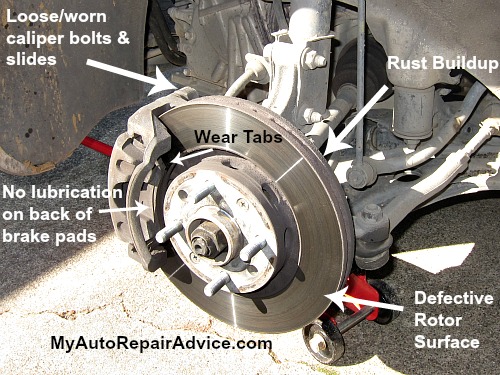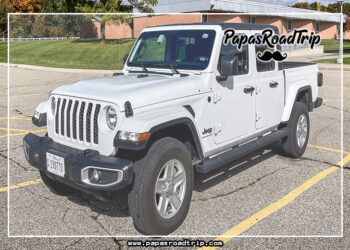New brakes should be quiet. Yet, they sometimes squeak.
Why does this happen? New brakes squeaking can be frustrating and confusing. You expect your new brakes to be perfect. But, the squeaks can make you wonder if something is wrong. Sometimes, it’s just the newness of the parts. Other times, it might be a sign of a problem.
Understanding why new brakes squeak helps you know what to do next. This guide explains the common reasons behind the noise. It also offers tips on how to address and fix the issue. Stay with us to learn more about your brakes and keep your vehicle safe and sound.
Common Causes Of Squeaky Brakes
Squeaky brakes can be annoying and concerning. Understanding the causes is crucial. Here are some common reasons why your brakes might be making noise.
Worn Brake Pads
One of the most common causes of squeaky brakes is worn brake pads. Brake pads are designed to wear down over time. When they get too thin, they can produce a high-pitched squeal. This noise is usually a sign that it’s time to replace them.
Brake pads have a built-in indicator. This indicator makes noise when the pads are worn out. Ignoring this noise can lead to more serious problems. Always check your brake pads if you hear a squeak.
Glazed Rotors
Another common cause of squeaky brakes is glazed rotors. Rotors can become glazed when they overheat. This creates a smooth, glass-like surface. When brake pads press against glazed rotors, they can make a squeaking sound.
Glazing usually happens due to excessive braking or riding the brakes. To fix this, rotors may need to be resurfaced or replaced. Keeping your rotors in good condition will help prevent this issue.
| Cause | Description | Solution |
|---|---|---|
| Worn Brake Pads | Brake pads are too thin and make a squeal. | Replace the brake pads. |
| Glazed Rotors | Rotors have a smooth, glass-like surface. | Resurface or replace the rotors. |
Understanding these common causes can help you maintain your brakes. Regular maintenance can prevent annoying squeaks and ensure your safety.
Environmental Factors
New brakes squeaking can be quite annoying. Environmental factors often play a significant role in this issue. Understanding these factors can help maintain brake performance and reduce noise.
Moisture And Rust
Moisture can cause new brakes to squeak. When brakes get wet, a thin layer of rust can form on the brake rotors. This often happens overnight or during rainy days. The next time you drive, the rust gets scraped off, causing a squeaking sound.
In humid areas, this issue is more common. Regular driving can help reduce moisture buildup and minimize rust formation. Parking in a garage can also help keep your brakes dry.
Temperature Changes
Temperature changes can impact the performance of new brakes. When temperatures drop, brake materials can contract. This might lead to squeaking sounds, especially during the first few minutes of driving.
In contrast, extreme heat can cause brake parts to expand. This can also lead to squeaking noises. Regular checks and proper brake maintenance can help manage these temperature-related issues.
A simple way to deal with temperature changes is to allow your vehicle to warm up or cool down before driving. This can reduce the chances of your brakes squeaking due to sudden temperature shifts.
Installation Issues
New brake squeaking can be frustrating. Sometimes, the issue stems from installation problems. Here, we will look at two common installation issues: improperly installed pads and loose components.
Improperly Installed Pads
One common cause of brake squeaking is improperly installed pads. If the brake pads are not installed correctly, they can cause noise. Incorrect installation can lead to uneven wear. This can result in squeaking sounds.
Make sure the pads fit properly in the caliper. If they are too tight or loose, they can make noise. Also, check if the pads are aligned properly. Misalignment can cause them to rub against the rotor unevenly. This will create a squeaking sound.
To ensure proper installation, follow these steps:
- Inspect the brake pads for correct size.
- Ensure the pads fit snugly in the caliper.
- Align the pads correctly with the rotor.
Loose Components
Loose components can also cause brake squeaking. If any part of the brake system is not secured, it can move and create noise. This includes bolts, clips, and other hardware.
Check all components for tightness. Loose parts can vibrate when you brake. This vibration causes the squeaking sound. Use a torque wrench to tighten bolts to the manufacturer’s specifications.
Here is a table summarizing the common loose components:
| Component | Possible Issue |
|---|---|
| Bolts | May vibrate if not tightened |
| Clips | Can rattle if loose |
| Caliper | Can shift if not secured |
To avoid loose components causing noise, follow these steps:
- Check all bolts for proper tightness.
- Ensure clips are secure and in place.
- Verify the caliper is properly mounted.
Taking care of these installation issues can help stop brake squeaking. Proper installation ensures a quieter and safer ride.

Credit: www.youtube.com
Brake Material Quality
Brake material quality plays a big role in the performance of your brakes. Poor quality materials can lead to annoying squeaks. Let’s explore how different aspects of brake material quality can affect brake noise.
Low-quality Pads
Low-quality brake pads often lead to squeaking. They wear out faster. They also produce more dust. This dust can cause noise when braking. Cheap pads might not fit well. This poor fitment can cause vibrations. Vibrations lead to squeaks. Always choose high-quality brake pads. They last longer. They make less noise. They give better performance.
Incompatible Rotor And Pad Materials
Incompatible rotor and pad materials can also cause squeaking. Rotors and pads need to match. If they don’t, they can create friction. Friction causes noise. For example, using metallic pads on standard rotors can be noisy. The materials need to be compatible. Always check the manufacturer’s recommendations. Matching materials can reduce squeaks. They can also improve braking efficiency.
Driving Habits Impact
Driving habits can significantly impact the performance and longevity of your vehicle’s brakes. Certain behaviors can cause new brakes to squeak prematurely. This section will explore how aggressive braking and frequent short trips contribute to this issue.
Aggressive Braking
Aggressive braking involves stopping suddenly and forcefully. This can wear down the brake pads quickly. When brake pads wear down, they may start to squeak. This happens because the pad material is thin. Aggressive braking also generates a lot of heat. Excessive heat can cause the brake pads to harden. Hardened brake pads are more likely to squeak.
Frequent Short Trips
Frequent short trips can also affect your brakes. On short trips, brakes do not get a chance to warm up properly. Cold brakes are more likely to make noise. Short trips also involve repeated stopping and starting. This increases wear on the brakes. New brakes may start to squeak if they are not given time to break in properly. It’s important to give your brakes a chance to warm up and settle in.
Maintenance And Inspection
New brakes squeaking can be annoying. Proper maintenance and inspection are important. Regular checks ensure safety and performance. Learn about essential practices below.
Regular Brake Inspections
Regular brake inspections are vital. Schedule these checks every six months. Look for wear, tear, and any damage. Inspections help spot problems early. This can prevent costly repairs.
- Check brake pads for thickness.
- Inspect rotors for grooves.
- Look at brake lines for leaks.
Use the table below to understand common inspection points:
| Inspection Point | What to Look For |
|---|---|
| Brake Pads | Thickness and even wear |
| Rotors | Smooth surface without grooves |
| Brake Lines | No leaks or cracks |
Timely Pad Replacement
Timely pad replacement is crucial. Brake pads wear down over time. Replacing them on time can prevent squeaking. It also ensures good braking performance.
- Listen for a high-pitched noise.
- Check for a grinding sound.
- Observe brake pedal vibrations.
Replacing worn-out pads can save money. It protects other brake components. Always use quality brake pads. This ensures better performance and longer life.
Diy Solutions
New brakes squeaking can be very annoying. Fortunately, there are simple DIY solutions that can help. These fixes are easy and can save you money. Let’s dive into some effective methods to stop the noise.
Lubricating Brake Components
One common solution is lubricating brake components. This method targets the moving parts of the brake system.
You will need a high-temperature brake grease. Follow these steps:
- Remove the wheel to access the brakes.
- Identify the caliper and brake pads.
- Apply grease to the back of the brake pads.
- Lubricate the caliper slides and pins.
- Reassemble the brake components and wheel.
Lubrication reduces friction. It allows the brake parts to move smoothly. This can stop the squeaking sound.
Resurfacing Rotors
Another effective method is resurfacing rotors. Warped or uneven rotors can cause squeaking. This process smooths out the rotor surface.
Here’s how you can do it:
- Remove the wheel and brake caliper.
- Take off the rotor.
- Use a brake lathe to resurface the rotor.
- Ensure the rotor is even and smooth.
- Reinstall the rotor and brake caliper.
- Put the wheel back on.
Resurfacing rotors ensures even contact with the brake pads. This process can eliminate the squeaking noise.

Credit: automotive.repair
When To Seek Professional Help
New brakes can sometimes squeak, causing concern for many drivers. Knowing when to seek professional help is crucial. This section will guide you on when it’s time to consult a mechanic.
Persistent Noise Issues
If the squeaking sound continues for more than a week, it might be a sign of a problem. Persistent noise could indicate issues like improper installation or inferior brake pads. It’s best to have a professional check it out.
Here are some common causes of persistent brake noise:
- Worn-out brake pads
- Misaligned brake components
- Accumulation of dirt or debris
Safety Concerns
Brakes are vital for safety. If you hear squeaking along with other issues, it’s time to act. Some key safety concerns include:
| Symptom | Possible Issue |
|---|---|
| Vibrations when braking | Warped rotors |
| Car pulls to one side | Uneven brake wear |
| Soft or spongy brake pedal | Brake fluid leak |
If any of these symptoms occur, stop driving the car. Call a professional immediately. Your safety is paramount.

Credit: www.wikihow.com
Frequently Asked Questions
Why Are My New Brakes Squeaking?
New brakes might squeak due to high humidity, dust, or the bedding-in process.
How Long Should New Brakes Squeak?
New brakes may squeak for a few days while they settle in.
Can I Drive With Squeaky Brakes?
Yes, but it’s best to have them checked to ensure safety.
How Can I Stop My Brakes From Squeaking?
Ensure proper installation, clean components, or apply anti-squeal lubricant.
Is It Normal For New Brakes To Make Noise?
Yes, new brakes often make noise until they are fully bedded-in.
Conclusion
Squeaky brakes can be annoying, but don’t ignore them. Address the issue quickly. Check for common causes like dust, moisture, or wear. Regular maintenance helps keep brakes quiet and safe. Consult a professional if you’re unsure. Taking action now prevents bigger problems later.
Enjoy smoother, quieter rides with well-maintained brakes.

















